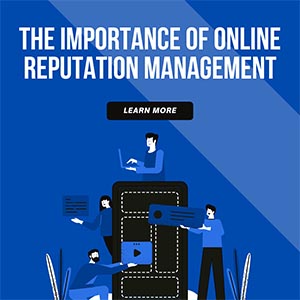Your Online Reputation: A Key Asset
Online reputation is the way people see your brand based on information they encounter online. That information includes many things: social media presence, search results, reviews, publicity, and more. Your reputation online can change quickly, so careful management is key. It’s also ongoing—a company’s reputation is never set in stone. Businesses that ignore their reputation in the virtual world often come to regret it, but those that prioritize their digital reputation reap rewards in numerous areas:
- Customer acquisition
- Customer retention
- Consumer trust
- Buying decisions
- Partnerships
- Interest from talented job seekers
- International attention from potential investors and partners.
What is Online Reputation Management?
Online reputation management has many facets, but it boils down to a few key points:
- Monitoring your business’s reputation
- Taking proactive action to influence that reputation
- Responding quickly and intelligently to both good and bad feedback
Though you’ll never have full control of what the public thinks, you’re far from helpless. There are numerous methods of spreading positive information, fostering trust, and dealing with negative sentiment. You can jump into online discussions with fans to build rapport and answer questions, showing them you really care. It’s a form of customer service that only became possible because of the internet.
Responses to negative feedback are also helpful—but only if they’re thoughtful and empathetic. A proactive approach is critical. Waiting until a problem arises to develop a response strategy usually means an issue has already spun out of control. Businesses that manage proactively also plan proactively, meaning they’ll be ready to jump into action with a well-executed strategy if and when their reputation takes a hit.
Reputation Management Strategy
Nowadays, you’ve got to create and boost content. Before jumping into the content creation game, consider your company’s underlying values and unique selling proposition. From there, you can develop content that accurately represents your business while grabbing attention and making people feel good about what you do. Search engine optimization (SEO) will help a lot when it comes to gaining visibility. Remember that consistency is key; though you need to tailor your content to each unique platform, all of it should convey the same basic message. Employees should also be well-versed in how to properly represent the company online.
Managing a reputation on the web is more complicated than it may seem at first. Monitoring is vital, but it requires software and other tools with learning curves. Without such software, you’ll probably never learn about the vast majority of mentions your business gets on various websites. There aren’t enough hours in the day to comb through Facebook, Reddit, YouTube, TikTok, Instagram, and other platforms—let alone assess everything.
Specialized software can perform quick analysis of vast collections of information to determine the attitudes of everyone discussing your business and which of those attitudes dominate. It assesses customer reviews and feedback for you, pulling data and other critical bits of information from a sea of online chatter all over the web. From there, you can use the information to adjust your strategy and improve your online reputation. There’s often a steep learning curve with reputation monitoring software, so working with an expert who’s acquired years of practice is ideal.



















